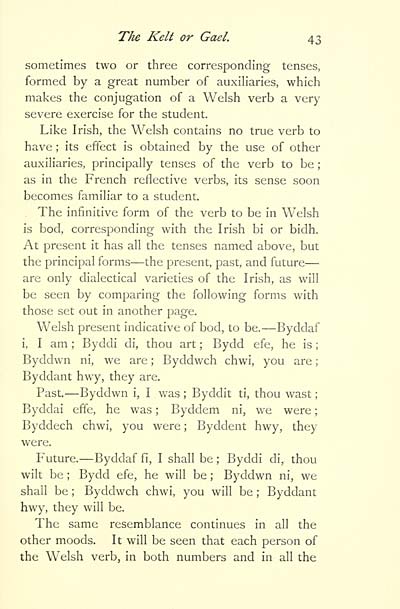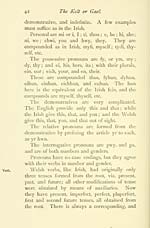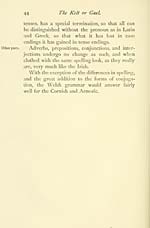Blair Collection > Kelt or Gael
(47)
Download files
Complete book:
Individual page:
Thumbnail gallery: Grid view | List view

The Kelt or Gael. 43
sometimes two or three corresponding tenses,
formed by a great number of auxiliaries, which
makes the conjugation of a Welsh verb a very
severe exercise for the student.
Like Irish, the Welsh contains no true verb to
have ; its effect is obtained by the use of other
auxiliaries, principally tenses of the verb to be ;
as in the French reflective verbs, its sense soon
becomes familiar to a student.
The infinitive form of the verb to be in Welsh
is bod, corresponding with the Irish bi or bidh.
At present it has all the tenses named above, but
the principal forms — the present, past, and future —
are only dialectical varieties of the Irish, as will
be seen by comparing the following forms with
those set out in another page.
Welsh present indicative of bod, to be. — Byddaf
i, I am ; Byddl dl, thou art ; Bydd efe, he is ;
Byddwn ni, we are ; Byddwch chwl, you are ;
Byddant hwy, they are.
Past. — Byddwn I, I was ; Byddit tl, thou wast ;
Byddai effe, he was ; Byddem ni, we were ;
Byddech chwl, you were ; Byddent hwy, they
were.
Future. — Byddaf fi, I shall be ; Byddi di, thou
wilt be ; Bydd efe, he will be ; Byddwn ni, we
shall be ; Byddwch chwl, you will be ; Byddant
hwy, they will be.
The same resemblance continues in all the
other moods. It will be seen that each person of
the Welsh verb, in both numbers and in all the
sometimes two or three corresponding tenses,
formed by a great number of auxiliaries, which
makes the conjugation of a Welsh verb a very
severe exercise for the student.
Like Irish, the Welsh contains no true verb to
have ; its effect is obtained by the use of other
auxiliaries, principally tenses of the verb to be ;
as in the French reflective verbs, its sense soon
becomes familiar to a student.
The infinitive form of the verb to be in Welsh
is bod, corresponding with the Irish bi or bidh.
At present it has all the tenses named above, but
the principal forms — the present, past, and future —
are only dialectical varieties of the Irish, as will
be seen by comparing the following forms with
those set out in another page.
Welsh present indicative of bod, to be. — Byddaf
i, I am ; Byddl dl, thou art ; Bydd efe, he is ;
Byddwn ni, we are ; Byddwch chwl, you are ;
Byddant hwy, they are.
Past. — Byddwn I, I was ; Byddit tl, thou wast ;
Byddai effe, he was ; Byddem ni, we were ;
Byddech chwl, you were ; Byddent hwy, they
were.
Future. — Byddaf fi, I shall be ; Byddi di, thou
wilt be ; Bydd efe, he will be ; Byddwn ni, we
shall be ; Byddwch chwl, you will be ; Byddant
hwy, they will be.
The same resemblance continues in all the
other moods. It will be seen that each person of
the Welsh verb, in both numbers and in all the
Set display mode to: Large image | Transcription
Images and transcriptions on this page, including medium image downloads, may be used under the Creative Commons Attribution 4.0 International Licence unless otherwise stated. ![]()
| Early Gaelic Book Collections > Blair Collection > Kelt or Gael > (47) |
|---|
| Permanent URL | https://digital.nls.uk/75787201 |
|---|
| Description | His ethnography, geography and philology. |
|---|---|
| Shelfmark | Blair.17 |
| Additional NLS resources: | |
| Attribution and copyright: |
|
| Description | A selection of books from a collection of more than 500 titles, mostly on religious and literary topics. Also includes some material dealing with other Celtic languages and societies. Collection created towards the end of the 19th century by Lady Evelyn Stewart Murray. |
|---|
| Description | Selected items from five 'Special and Named Printed Collections'. Includes books in Gaelic and other Celtic languages, works about the Gaels, their languages, literature, culture and history. |
|---|

